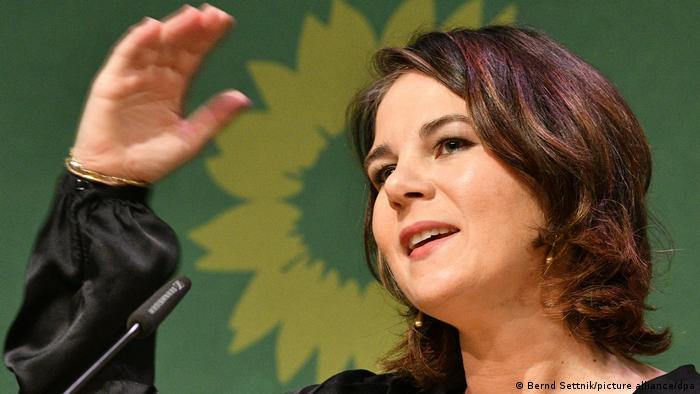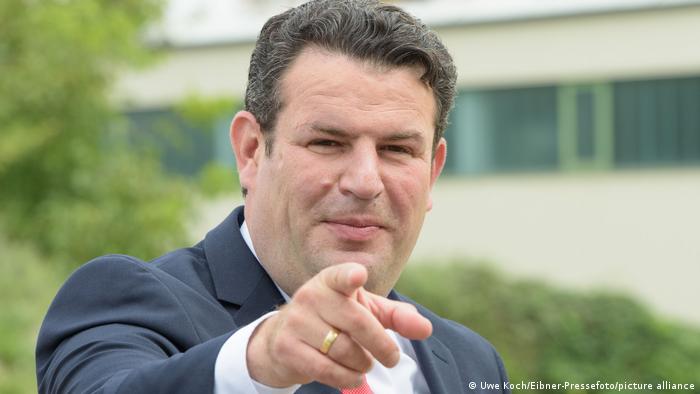Nancy Faesar is no stranger to dealing with enemies of an open, democratic and diverse society. The new German Interior Minister hails from the central German state of Hesse, which has repeatedly made the headlines because of right-wing extremist attacks. The most notorious took placein Hanau in February 2020, when a racist attacker shot nine people in a hookah bar.
Even before that, Hesse hit international headlines in June 2019 when a neo-Nazi murdered the center-right Christian Democrat (CDU) local politician Walter Lübcke, because of his support for refugees.
And back in 2006, Halit Yozgat was shot in an internet cafe in Kassel, the ninth of ten victims of the National Socialist Underground (NSU), a far-right neo-Nazi terrorist group.
In charge of intelligence service and police
Nancy Faeser has placed herself in the tradition of anti-fascists and women’s rights activists. The married mother of a six-year-old son experienced is a trained lawyer and spent time studying in the United States before joining an international business law firm in Frankfurt. In the negotiations to form the new three-way coalition, she was a negotiator for the center-left SPD in the working group on migration and integration – key topics for the federal interior ministry.
As a member of the Hessian state parliament from 2003, Nancy Faeser has had to deal with the far-right extremist crimes time and again. And now she will face similar challenges at a national level in her new job in Berlin.
As Minister of the Interior, she is responsible for security in Germany. She is in charge of such important agencies as the Federal Office for the Protection of the Constitution (BfV), Germany’s domestic intelligence service, the Federal Criminal Police Office (BKA), and the federal police. She becomes the first woman to hold this role.
For a long time the Interior Minister with its 70,000 employees, has been headed by conservative ministers. The fight against right-wing extremism and antisemitism, and allegations of racism in various police units have been on the agenda there.
In March 2021, Kaeser addressed the Hesse state parliament and explained: “The fight against right-wing extremism has led me personally into politics.”
She referred back to famous Social Democrats who fought against Adolf Hitler and Nazism: Otto Wels, Kurt Schumacher, and the West German Chancellor and Nobel Peace Prize winner Willy Brandt.
She knows from her own experience what can happen if you stand up against right-wing extremism and for equal rights: She received personal threats from the “NSU 2.0” This was an allusion to the terrorist group led by Beate Zschäpe, who has since been sentenced to life in prison.

On the anniversary of the Hanau attack, Nancy Faeser (l) joined other mourners to lay a wreath
Other female politicians in Hesse received threats, too. And there were links to the Hesse police: Seda Basay-Yildizs, a lawyer for an NSU victim received death threats. It then emerged that her confidential data had been accessed from a police computer in Hesse. It is still unclear whether the data breach was intentional or a result of negligence.
As a member of the NSU investigation committee of the Hessian state parliament, Faeser looked into the circumstances surrounding Halit Yozgat who was shot and killed by right-wing terrorists while an informant of the state domestic intelligence service sat next door and saw nothing. It has proved impossible to clear up that case, as the state’s coalition government of center-right CDU and the Greens wants to keep the files under lock and key.
The leader of the Left Party, Janine Wissler, also knows the new German Interior Minister from that time. “I worked well with Nancy Faeser in Hesse, especially during the NSU investigation committee,” Janine Wissler told DW. She described Faesar as a committed comrade-in-arms in the fight against right-wing violence and threats such asthe “NSU 2.0.”
As the leader of the opposition in Hesse, Faeser repeatedly accused the CDU-Green state government of serious failures in the fight against right-wing extremism. Now Kaeser will take up the fight against extremism at the federal level, where the focus of German and international public attention is high.
-
Chronicle of the NSU murders
A mysterious string of murders
For years, neo-Nazis of the right-wing organization National Socialist Underground (NSU) killed people across Germany. The suspects: Uwe Mundlos, Uwe Böhnhardt (center) and Beate Zschäpe. Their victims: eight people of Turkish origin, one Greek man and a German policewoman. Their motive: xenophobia. Until 2011, the German public was not aware of the scope of their crimes.
-
Chronicle of the NSU murders
Unsuccessful bank robbery
The murder spree was uncovered on November 4, 2011, when Mundlos and Böhnhardt robbed a bank in the east German town of Eisenach. For the first time, they failed. Police officers surrounded the caravan in which the two men were holed up. A later investigation concluded that Mundlos first shot and killed Böhnhardt, then set the caravan on fire and killed himself.
-
Chronicle of the NSU murders
Zschäpe turns herself in
Shortly after the death of Böhnhardt and Mundlos there was an explosion at Frühlingsstraße 26 in Zwickau, in the state of Saxony. Beate Zschäpe lived at that address together with the two bank robbers. Zschäpe allegedly set the house on fire to destroy evidence. Four days later, she turned herself in to the police. The terror suspect has been custody since that day.
-
Chronicle of the NSU murders
The truth comes out
In the ruins of the Zwickau flat, police officers found a self-made video in which the terror cell claimed responsibility under the name of the NSU, the National-Socialist Underground. The 15-minute video shows crime scenes and pictures of the victims killed by the right-wing terrorist group between 2000 and 2007.
-
Chronicle of the NSU murders
NSU claim responsibility
Famous cartoon character The Pink Panther hosts the amateur video, which is full of slogans of hatred against people with an immigrant background and which mocks the murder victims. Before her arrest, Zschäpe allegedly sent out copies of the video in which the NSU claimed responsibility for the crimes.
-
Chronicle of the NSU murders
Verbal slip-ups
Until 2011, the term “döner murders” was frequently used when reporting about the killings. Nothing was known about the connection between the individual cases, nor about the motive. There were rumors the victims were linked to the drug scene. But the NSU’s video left no doubt. The term “döner murders” was chosen as Germany’s “Unwort des Jahres” (doublespeak of the year) in 2011.
-
Chronicle of the NSU murders
NSU also behind Cologne pipe bomb
“The findings made by our security authorities so far show no indication of a terrorist background, but of a criminal milieu,” said German Interior Minister Otto Schily on June 10, 2004. A day earlier, a pipe bomb explosion in Cologne left 22 people injured and many shops damaged. In 2011, it became clear: the NSU’s right-wing terrorists were also behind the Cologne bombing.
-
Chronicle of the NSU murders
Memorial service in Berlin
On February 23, 2012, Germany commemorated the victims. At the ceremony at a Berlin concert hall, the focus was on the relatives of the victims. Semiya Simsek (right), the daughter of the murdered flower stand owner Enver Simsek, gave an emotional speech. German Chancellor Angela Merkel made an official apology to the victims and promised them that all questions would be answered.
-
Chronicle of the NSU murders
Memorial for Mehmet Kubasik
“Dortmund is a colorful, tolerant and welcoming town – and opposes right-wing extremism!” This statement was made by mayor Ullrich Sierau at the unveiling of the memorial stone for NSU victim Mehmet Kubasik in September 2012. The memorial was set up just meters away from the kiosk in which Kubasik was killed on April 4, 2006.
-
Chronicle of the NSU murders
Solidarity with the victims
On November 4, 2012, exactly a year after the terror cell was uncovered, people in many German cities staged solidarity demonstrations against right-wing extremism. The protesters called for thorough investigations into the racially motivated murders – which in their view was not happening fast enough.
-
Chronicle of the NSU murders
Beate Zschäpe lone survivor
Believed to be the last survivor of the NSU trio, Beate Zschäpe went on trial in May 2013.Over 800 witnesses were heard. Zschäpe did not speak for the first two and a half years of the trial.
-
Chronicle of the NSU murders
Life sentence
Beate Zschäpe was given a life sentence. She was found guilty of joint complicity in 10 counts of murder, arson, robbery, extortion, the formation of a terrorist organization and membership in a terrorist organization. Though there was no evidence that she herself was present at the scene of the crimes, the judges felt that the “particular severity of guilt” required for a life sentence applied.
-
Chronicle of the NSU murders
The co-accused
Ralf Wohlleben received 10 years for procuring weapons for the NSU, co-accused Holger G. got three years for providing false identity papers. Another co-accused, Andre E, received two and a half years for providing the NSU with rail passes in his and his wife’s name. He also allegedly rented a mobile home which the cell drove to Cologne to carry out a bombing.
-
Chronicle of the NSU murders
Long lasting impact
When conservative politician Walter Lübcke was murdered by a neo-Nazi activist in 2019, his name was also found on the ‘list of enemies’ for targetted killings. Lübcke had come under attack from the far-right following a speech he made in 2015 defending the decision to take in refugees from the Syrian war.
-
Chronicle of the NSU murders
Securty agency failings
The federal and the state parliaments launched investigations to shed light on the security authorities’ failures in the NSU case: The role of paid informants, the lack of cooperation between the various intelligence agencies and state interior ministries, which are responsible for police in the respective states, and allegations of systemic racism on the part of German authorities.
Author: Anna Peters / nh
Data protection and surveillance
Data protection issues may prove controversial in the new coalition government in Berlin. Both the Green Party and the neoliberal Free Democrats (FDP) oppose the highly controversial data retention law, which pits them against Kaeser’s.
The two smaller parties are also skeptical of the German Federal Intelligence Service (BND)’s mandate to monitor telecommunications – which the Federal Constitutional Court has ruled to be unconstitutional.
In short, when it comes to security policy, the new federal government is by no means united. For Nancy Faeser, this will be a new experience. After all, as German Minister of the Interior, she will be dealing with larger issues of national and international security architecture than she has been doing as opposition leader in a German state.
This text has been translated from German.
-
Meet Germany’s government
Chancellor Olaf Scholz (SPD)
Germany’s chancellor was finance minister and vice-chancellor in Angela Merkel’s government. He campaigned on stability and pragmatism to become the Federal Republic’s ninth chancellor and the fourth Social Democrat to hold the office. The former mayor of Hamburg handed his center-left party a surprise win in September’s election.
-
Meet Germany’s government
Finance Minister Christian Lindner (FDP)
Media-savvy Christian Lindner has been leader of Free Democratic Party (FDP) since 2013, inheriting a party that had just lost representation in parliament in the election. The 42-year-old’s reward for leading the neoliberal resurrection is the second most powerful office in the land — raising eyebrows among some who pointed out that his party actually finished behind the Greens in the election.
-
Meet Germany’s government
Economy and Climate Protection Minister and Vice Chancellor Robert Habeck (Greens)
The Greens have expanded the influential Economy Ministry to include its signature issue, climate protection, while also enhancing the power of 52 year-old Green Party co-leader Robert Habeck. A member of the more moderate “realist” wing of the party, Habeck the author of childrens’ books was already Environment and Agriculture Minister in his home state of Schleswig-Holstein.
-
Meet Germany’s government
Foreign Minister Annalena Baerbock (Green Party)
Angela Baerbock, the party’s 40-year-old chancellor candidate, is set to be the new Foreign Minister, and has already ruffled feathers by taking a tougher tone on China. Baerbock is only the second Green politician to take on the post, after Joschka Fischer in the late 1990s.
-
Meet Germany’s government
Interior Minister Nancy Faeser (SPD)
Possibly the biggest surprise in Scholz’s new Cabinet, Faeser has been elevated from SPD party leader in Hesse to one of Germany’s biggest ministries, her first role at federal level. Some observers hope her appointment signal an intention to get tougher on far-right extremism. She is the first woman to hold the office.
-
Meet Germany’s government
Health Minister Karl Lauterbach (SPD)
A popular choice for Germans who have enjoyed his outspoken appearances on TV talk shows, Lauterbach has been the face of the SPD’s tough health policy throughout the COVID-19 pandemic. His reward is a tricky post in which he will likely oversee the introduction of mandatory vaccines.
-
Meet Germany’s government
Justice Minister Marco Buschmann (FDP)
The 44-year-old Buschmann was first elected to the Bundestag in 2009 and remained an influential politician in the party throughout the FDP’s lean years from 2013 to 2017. His signature issue in parliament was protecting individual freedoms, though he has now come out in favor of mandatory vaccines.
-
Meet Germany’s government
Defense Minister Christine Lambrecht (SPD)
Angela Merkel’s last justice minister has now been put in charge of Germany’s armed forces and one of the biggest budgets at the Cabinet table. Some political observers had the 56-year old pegged for the Interior Ministry role, and her experience with military affairs is seen as limited.
-
Meet Germany’s government
Food and Agriculture Minister Cem Özdemir (Greens)
The veteran Green Party politician will finally join the federal government after over a quarter-century in the German parliament. The first-ever German Cabinet minister with Turkish parents is a party moderate and outspoken critic of Turkish President Erdogan. He co-chaired the Green Party for close to a decade.
-
Meet Germany’s government
Environment, Nature Conservation, Nuclear Safety and Consumer Protection Minister Steffi Lemke (Greens)
The ministry with the longest name has gone to the much-respected Steffi Lemke, among the handful who co-founded the Greens’ East German branch in 1989. During her first spell in the Bundestag (1994-2002), she was also one of the few Green Party parliamentarians to initially oppose German participation in the Afghan war.
-
Meet Germany’s government
Transport and Digital Infrastructure Minister Volker Wissing (FDP)
FDP General Secretary Volker Wissing is the party’s second most powerful politician after leader Christian Lindner. He is also no stranger to a coalition with the SPD and the Greens, having spent five years as Rhineland-Palatinate’s Economy Minister.
-
Meet Germany’s government
Construction and Housing Minister Klara Geywitz (SPD)
One of only two East Germans in the new Cabinet, Klara Geywitz has been tapped to head a new ministry set up at the insistence of the SPD. Housing has become an acute issue in Germany, where urban areas are fast running out of affordable housing. Geywitz was Scholz’s co-candidate in their failed bid for the SPD leadership in 2019.
-
Meet Germany’s government
Labor and Social Affairs Minister Hubertus Heil (SPD)
43-year-old Heil will keep the post that he held during Angela Merkel’s last government, indicating that his party his pleased with his work. Among his key issues has been trying to increase pay for care home workers, which Germany is desperately short of. He will also oversee the increase in Germany’s minimum wage to €12 ($13.60) an hour.
-
Meet Germany’s government
Economic Cooperation and Development Minister Svenja Schulze (SPD)
Angela Merkel’s last environment minister is to become Scholz’s first development minister. The 53-year-old Schulze is an outspoken opponent of nuclear power and a member of several environmental organizations.
-
Meet Germany’s government
Education and Research Minister Bettina Stark-Watzinger (FDP)
Head of the Hesse FDP, 53-year-old Stark-Watzinger was part of the party’s negotiating team in coalition negotiations and a specialist in finance and education policy. She has called for an “educational revolution” in Germany, ushering a major digitalized overhaul of the current system. She also lived in the UK for nine years.
-
Meet Germany’s government
Family, Senior Citizens, Women, and Youth Minister Anne Spiegel (Greens)
The 41-year-old Anne Spiegel has already had a meteoric career at state level. Having held the Family Ministry in Rhineland-Palatinate since 2016, she became the state’s new Climate Protection minister in May after leading the Greens’ election campaign in this year’s state election. She has now been promoted even higher.
-
Meet Germany’s government
Chief of Staff and Minister for Special Affairs Wolfgang Schmidt (SPD)
Scholz’s right-hand man in the Cabinet will be Wolfgang Schmidt, who worked with the chancellor when Scholz was mayor of Hamburg. Chief of staff with a special ministerial brief that gives the chancellorship extra weight in the Cabinet, Schmidt’s role will largely involve coordinating the ministerial work of the three parties.
-
Meet Germany’s government
Federal Government Commissioner for Culture and the Media Claudia Roth (Greens)
Claudia Roth is moving into the spotlight of German cultural policy. Within the Chancellor’s office, the 66-year-old will also be responsible for DW. Former party leader Roth is one of the most prominent faces of the Green Party. Most recently, the former manager of the anarchist band Ton Steine Scherben was Vice President of the Bundestag.
Author: Ben Knight, Lisa Hänel
While you’re here: Every Tuesday, DW editors round up what is happening in German politics and society. You can sign up herefor the weekly email newsletter Berlin Briefing, to stay on top of developments as Germany enters the post-Merkel era.








































